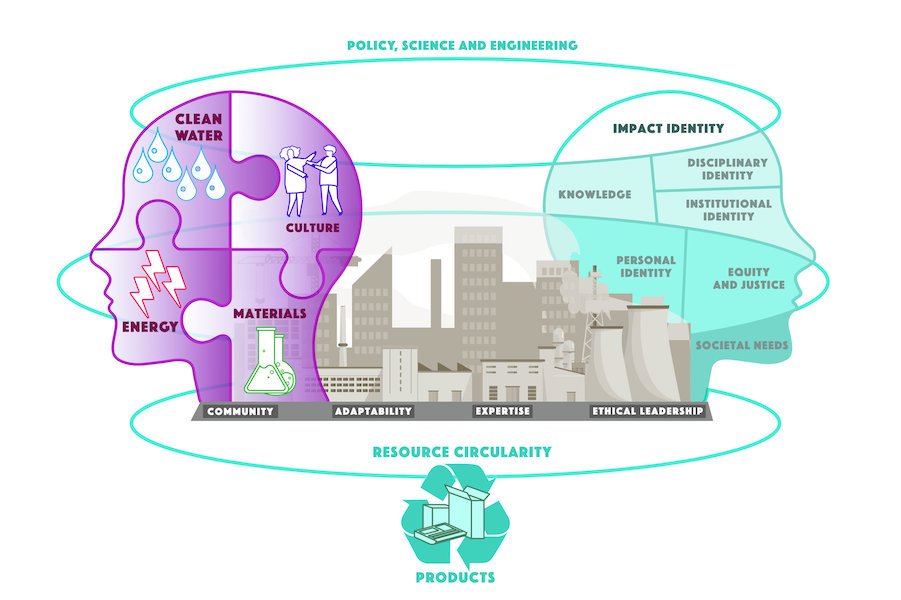UMN receives $3 million for interdisciplinary NSF Research Traineeship program

Program will better educate students on topics like sustainability, resource conservation, and waste upcycling
MINNEAPOLIS / ST. PAUL (08/02/2022)—An interdisciplinary team of University of Minnesota Twin Cities faculty, staff, and researchers spanning fields of engineering, public policy, and art has received a $3 million grant from the National Science Foundation to implement an interdisciplinary, cross-college research traineeship program that aims to better educate students on topics like sustainability, resource conservation, and waste reduction.
This new NSF Research Traineeship (NRT) program will focus on the idea of creating a “circular economy” where waste and pollution are eliminated, resources like water and energy are upcycled, and natural processes can thrive. Through classes, internship and research experiences, and mentorship, students will learn about these topics and how to consider different cultural perspectives, social equity, and community impact in their work.
The program will be run by the College of Science and Engineering in partnership with the University’s Hubert H. Humphrey School of Public Affairs, the Weisman Art Museum, and the Institute on the Environment.
“What’s unique about our program is that it's designed to develop a cohort of students from multiple disciplines within science and engineering and the Humphrey School of Public Affairs,” said Bill Arnold, a co-PI on the project and a professor in the University of Minnesota Twin Cities’ Department of Civil, Environmental, and Geo- Engineering. “Some of these grand challenges we face aren't going to be solved by a purely technological solution or a purely policy solution, and we need people who can work in both of those spaces to find the innovative solutions that we need.”
The funding from NSF will provide fellowships to about 30 graduate students to participate in the program, but undergraduate students and other graduate students across the University will also be able to take classes and participate in the training experiences. The University of Minnesota team expects that about 300 students will participate in some form.
The program will also establish an artist-in-residence at the Weisman Art Museum on campus who will co-teach classes and help students learn about their “impact identity” and how their work impacts the communities around them. The resident artist will facilitate community engagement sessions where students will interact and learn directly from Twin Cities community members.
"Artists are experts at navigating the intersections of research, process, and cultural and community impact. Their creative work doesn't emerge from a vacuum—it's always in conversation with audience need and response," said Alejandra Peña, director of the Weisman Art Museum. "This collaboration, which deploys the professional expertise of cultural producers to help train those outside the arts sector in thinking strategically and thoughtfully about the long-term, human impacts of their work, opens exciting opportunities for further knowledge sharing across fields of study outside the arts."
The team plans to begin the program in fall 2022, with the first cohort of grad students likely beginning classes and training in spring 2023.
"The interdisciplinary aspects of the program are unique, and to be able to apply those perspectives to real world challenges in sustainability makes for a pretty exceptional opportunity for students,” said Bonnie Keeler, a co-PI on the project and associate professor at the University of Minnesota Humphrey School of Public Affairs. “Policy students, engineers, and artists are uncommon collaborators, and yet the complexity of our current sustainability challenges necessitates new approaches. I'm excited to see how this program affects and changes all who participate.”
